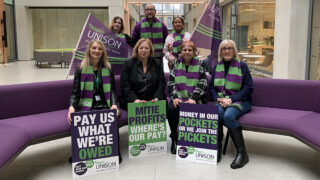The UK has ground to a halt under the COVID-19 lockdown and the Home Office has slowed its operations. With unclear immigration guidance available, thousands of workers are now worried about the security of their visas and the life they’ve built in the UK.
Samaanatha* is one of them. A children’s social worker in the Midlands, Samaanatha came to the UK in 2015, after being recruited directly from India.
After five years of working in children’s safeguarding for a council, she is now entitled to apply for Indefinite Leave to Remain (ILR), which will allow her to live permanently in the UK without having to give up her Indian citizenship. With ILR, Samaanatha can live, work and use the NHS without having to become a British citizen or get a British passport.
The ILR application process is long and costly (the application costs £2,389, with an additional £500 if you want to pay for the one-week priority service, or £800 for same-day service), with a requirement to complete an English language test (costing another £170) and sit a ‘Life in the UK’ test (£50).
When applying for ILR, you can expect to send off your passport, test results and documents for a six-month waiting period.
COVID’s spanner in the works
On top of all of this, COVID-19 has thrown up huge barriers and worries for almost every step of Samaanatha’s application.
“I had my ‘Life in the UK’ test booked for mid-March, but the test has now been cancelled a number of times due to COVID-19,” says Samaanatha.
“Even after doing this job successfully in an English-only country, working with English people, writing court reports and assessments in English for five years, now I’m being asked to prove my English language proficiency.
“Even though test centres will be reopening soon, I have another barrier: the priority application processing service is not available. The idea of surrendering my passport to the Home Office for six months during COVID-19 is very stressful.
“My family is back home in India, and I don’t know if I’ll need to travel to them if anything happens during COVID-19. If the Home Office has my passport and I need to travel home at short notice, I’ll need to request my passport back, and this would cancel my application.
“I know some people whose parents have died recently, and they haven’t been able to travel.”
Samaanatha is worried that with a potential backlog in applications caused by lockdown, even though she’s prepared to pay the priority fee, she could have to wait even longer than six months for approval.
“I want the government to bring back the priority service, or to bring everything online,” she says.
“If you’re a European migrant applying for permanent residence, all you need to do is upload your passport to an app and enter your national insurance number online. I don’t see why it can’t be the same for ILR.”
The process for EU migrants to apply for settled status in the UK is free, and applicants can scan their documents using a phone.
Unwavering public service
Samaanatha’s experience of the UK immigration system hasn’t ever been easy, but her dedication to public service has never wavered.
She first came to the UK five years ago, because the UK has a national shortage of social workers and, as one of the professions on the Home Office ‘Shortage Occupation List’, she could get a Tier 2 visa to live and work in the UK. The process was rigorous.
“In order to get this job, I had to have a masters’ degree in social work and three years of post-masters experience with children,” says Samaanatha.
“A UK agency came to India to do the recruitment, there was a sequence of interviews and group discussions. When I finally moved here, I had to start everything from the beginning, from finding a place to live and learning how to drive here. It was quite difficult.
“There’s a national shortage of social workers, with agency workers coming and going. It’s because the work is stressful and there are a lot of responsibilities. You need to do things very carefully, spending lots of time in courts and with lots of documentation and assessments.
“Being a children’s social worker is really difficult. Safeguarding children who are undergoing potential abuse and neglect, and removing them from families is an emotionally demanding job, with a lot of time pressure and big workloads too. I often have to face upsetting situations and try to stay calm and balanced.”
Despite her visa being tied to her employment, Samaanatha has paid for all aspects of her application, from flights to visa application costs and the NHS surcharge. Under her current visa, she has no access to benefits or state support.
The uncertainty about when she can apply for ILR, and how long she may be without her passport, is unbelievably stressful.
“It’s really affecting my mental health,” she says. “It brings me lots of anxiety. Especially when I’m doing a job that needs me to focus a lot and make the best decisions for vulnerable families. Life itself is difficult as a migrant, and now we have the COVID-19 situation on top of that.
“There are a lot of days where I feel very upset and sad, and lots of nights when I wake up in the middle of the night upset and continuously worried.
“When you have elderly and vulnerable parents, you want to be able to go and see them when you need to. When you hear about people passing away back home, you feel that insecurity. The Home Office doesn’t give very clear guidance, and it’s a very uncertain situation.”
An easy fix
All key workers are facing stressful working conditions right now, but for migrant workers this stress is doubled by the insecurity around visas.
“It’s hard that migrants like me are doing all of this difficult frontline work and also having to face all of this uncertainty,” Samaanatha says.
She describes how two simple changes to the immigration system would make a tremendous difference to her in the midst of COVID-19.
“If the government can either bring the priority service back, or let us keep our passports and BRP card and submit our documents online, that itself would be a great relief.
“Having to give up your passport and not being able to travel to your family feels like a violation of our human rights to freedom of movement and rights to family.
“It would be ideal if the government could waiver or even reduce the massive ILR fee, or at least make the process equal for people from EU and non-EU countries.
“It’s discriminatory that non-EU citizens cannot submit their documents virtually and have to undergo a complex process and pay massive sums of money.”
UNISON is calling for the government to automatically grant ILR to all migrant key workers.
*Samaanatha is not her real name, for fear that identification may impact on her job or visa. She requested to be called by this name, which means ‘equality’ in Hindi.




